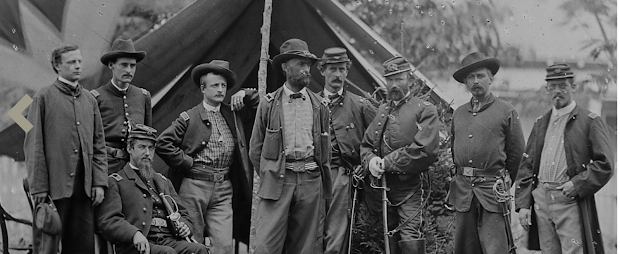Army Life, A Private’s Reminiscences of the Civil War, Rev. Theodore Gerrish (Portland ME 1882) https://hdl.handle.net/2027/loc.ark:/13960/t0bv88f91
20ME, Peebles’ Farm Sept. 30, 1864 p. 216: “We remained within the line of captured works, while the Ninth corps followed on after the retreating enemy. They had not advanced far before the rebels turned upon them with such vigor that our line was rolled back in confusion, and our division was ordered to advance on the double-quick, and check the rebels' advance. General Griffin entered into the spirit of the occasion, and soon formed us into line on a low crest of land covered with a scattering growth of wood. The enemy must advance in our front, and climb up the ascent, down which we could send our messengers of death to meet them. Griffin saw that he was to [217] contend with a force that was vastly his superior in point of numbers, and ordered his artillery to advance and take a position in his line of battle. A captain, commanding one of the batteries, pointed to our line of battle, which was but little more than a strong skirmish line, and, in much surprise, remarked, " My God, General, do you mean for me to put my guns out on that skirmish line ? " General Griffin, with much vehemence rejoined, " Yes, rush them in there ; artillery is no better than infantry, put them in the line, and let them fight together," and the guns were placed in the line of battle, loaded to their muzzles- with grape and canister. The rebels were not aware of the reception they were to re ceive, and just at dark came charging across the field in our front. Our infantry opened upon them furi ously; nothing was heard but the clanging of the steel rammers and the sharp crack of the rifles. The enemy soon came within range of the artillery, and then those guns joined in the awful music. It was enough to make us shudder, as we saw the fear ful execution that our guns made on the advancing lines, but with a desperate determination they kept on, and soon they reached our line. Then it was a sharp, bloody strife ; clubbed rifles were freely used ; bayonets gleamed with blood ; and then the brave line of rebels were rolled back in defeat, leaving their dead and wounded in our possession. It was one of the fiercest fights of the campaign. Our brigade was that day commanded by Major Spear of the Twentieth Maine, and that regiment was under the command of Captain A. W. Clark.
p. 219 “General Meade suggested to General Griffin that it would be well for him to intrench his position, but Griffin, whose blood was boiling over the inspiration of the battle just fought, replied, " I don't need any breastworks ; I can whip the whole rebel army with my little division," but the intrenchments were made, notwithstanding this remarkable fact.”
p. 291: April/May 1865: March back after surrender, near Richmond: “Our marching for the few following days was severed. General Griffin, who was in command of our corps, seemed to have forgotten the great interest that he had always manifested for his men, where there was no possible [288] reason for haste, we were rushed along almost beyond the power of human endurance, so that that last march was one of the most severe of the whole war.”
p. 345 CHARLES GRIFFIN Was the popular and brilliant commander of the First division of the Fifth corps, until the removal of General Warren, when he assumed command of the corps. No officer in the army could have been more dearly beloved by his men than was General Griffin. At one time he was absent from us for several weeks, on account of sickness ; on his return, when he met his old division, the men rushed from the [346] ranks, and pressed around him by hundreds, and actually removed him from his horse and carried him for several rods upon their shoulders. With tearful eyes he exclaimed, " Boys, 1 will never leave you again." He was a tall, slim, well-built man, and rode very erect, with his head well thrown back, and with his long, sharp chin well advanced to the front. His uniform was always neat and well fitted to his form ; he usually wore a soldier's cap upon his head ; his face was shaved smooth, while his lip was adorned with a heavy mustache. General Griffin was one cf the finest looking officers in the army. Always kind, pleasant and cheerful, his presence even in defeat always seemed like a sunbeam. He was as fearless as a tiger, and would lead his division any where. He had formerly been an artillery officer, and consequently had great faith in that branch of the service, and would run his batteries out any where on the skirmish lines, if by so doing he could get the enemy under fire. When " Old Griff " was in command, we did not care much where we were ordered to go. The last time that we ever saw him, was when our regiment was marching from Arlington Heights to Washington, where we were to take the cars for Maine ; we met him as he was riding from the city, and gave him three rousing cheers, he taking off his hat and sitting with uncovered head until we had passed. We all mourned when his death was announced, several years after the close of the war. He died of yellow fever, in Texas. There were but few officers in the Union army more worthy of praise than was General Charles Griffin.

No comments:
Post a Comment